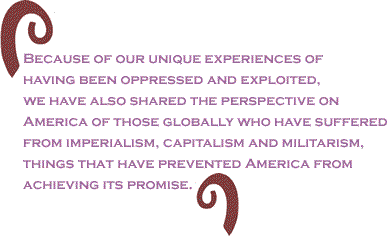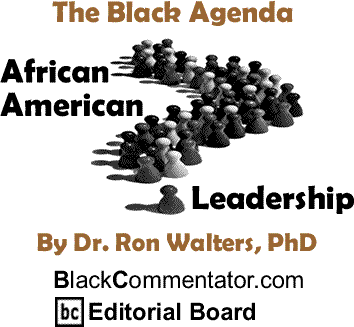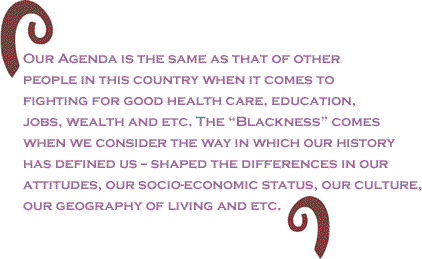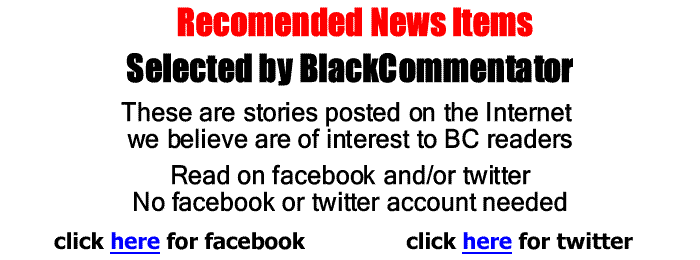
|
||||||||||||||||||||||
|
||
 |
||
There never has been a time when Black folks in America did not have an agenda, from when we tried to avoid captivity in Africa to be sent here, to when we were in the holes of slave ships, or on plantations planning ways to survive and to escape, or those of us today still trying to obtain the promised vestiges of freedom and equality.� The Black Agenda is our Black survival grocery list and Travis Smiley is right, to a great extent it is also an �American� Agenda.� But to �make America as good as its promise� means that we must confront a contradiction that may take away some of what the �American� Agenda is today.� Our Agenda is the same as that of other people in this country when it comes to fighting for good health care, education, jobs, wealth and etc.� The �Blackness� comes when we consider the way in which our history has defined us -- shaped the differences in our attitudes, our socio-economic status, our culture, our geography of living and etc.� So, while we might want and need WHAT other Americans want and need generally, it is HOW we want them specifically that matters most.� That is what makes our Agenda fit our unique wants and needs.� Is the fight to eliminate those differences an �American� fight?� I think so, because the culture of our people is one of many that have defined this country beyond the Anglo brand, then the attempt to achieve adequate material resources will enable us to live what has been referred to as �the American dream.�� This leads to the fulfillment of Dr. Martin Luther King�s dream that to acquire human equality in America would also enrich our civil rights and lead to our full citizenship, giving legitimacy to our right to participate in the decisions that would satisfy our needs and wants and those of the nation itself. The Black experience however, has not only been geared to the best in the fulfillment of the American dream and its promises of democracy and equality.� Because of our unique experiences of having been oppressed and exploited, we have also shared the perspective on America of those globally who have suffered from imperialism, capitalism and militarism, things that have prevented America from achieving its promise.� Nevertheless, we can also make the argument that in opposing these things, we are also attempting to make America as good as its promise, which means to go beyond what the framers of this country could see to position a new country with a new racial geography for a new century. But defining the Black Agenda is not enough.� How do we implement it?� In my book, Freedom Is Not Enough, I suggested that we have done very well with electoral politics.� We now vote in big numbers: in 2008 for the first time, Black voter turnout was greater than white voter turnout (the number of those who vote as a percentage of those who are eligible).� Our vote has elected over 9,000 Black officials and thousands more white elected officials.�� But we have not been as effective in turning that vote into the power that returns the goods and services back to our communities that we need to survive and prosper.
In other words, we need to place greater emphasis on the civic engagement that leverages our vote into public policy resources.� How many call their elected officials?�� The cell phone is a powerful instrument of communication, but we use it more than 99% for social purposes.� What if we used it just 10% for political purposes: to call our congressperson, county officials, city council persons, mayors and etc.� We seem afraid to follow up the vote by demanding the accountability of our officials to the Black Agenda.� Now, I agree with Rev. Al Sharpton that we don�t always need to call it that, or put it on blast, but we need to have a sense of what it is and advocate for its contents.
BlackCommentator.com Editorial Board member, Dr. Ron Walters,PhD is a Political Analyst, Author and Professor Emeritus of the University of Maryland, College Park. His latest book is: The Price of Racial Reconciliation (The Politics of Race and Ethnicity) (University of Michigan Press). Click here to contact Dr. Walters. |
||
If you would like to comment on this article, please do so below. There is a 400 character limit. You do not need a FaceBook account. Your comment will be posted here on BC instantly. Thanks. Entering your email address is not mandatory. You may also choose to enter only your first name and your location.
|
||
Thank you very much for your readership. |
||
| Any BlackCommentator.com article may be re-printed so long as it is re-printed in its entirety and full credit given to the author and www.BlackCommentator.com. If the re-print is on the Internet we additionally request a link back to the original piece on our Website. | ||
| |
||
March 25, 2010 |
| Executive Editor: David A. Love, JD |
| Managing Editor: Nancy Littlefield |
| Publisher: Peter Gamble |
| Est. April 5, 2002 |
| Printer Friendly Version in resizeable plain text format |
 |
 |
 |

|
 |
| |
| |


































 ���
���











